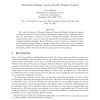Free Online Productivity Tools
i2Speak
i2Symbol
i2OCR
iTex2Img
iWeb2Print
iWeb2Shot
i2Type
iPdf2Split
iPdf2Merge
i2Bopomofo
i2Arabic
i2Style
i2Image
i2PDF
iLatex2Rtf
Sci2ools
63
Voted
CORR
2010
Springer
2010
Springer
Normalized Range Voting Broadly Resists Control
We study the behavior of Range Voting and Normalized Range Voting with respect to electoral control. Electoral control encompasses attempts from an election chair to alter the structure of an election in order to change the outcome. We show that a voting system resists a case of control by proving that performing that case of control is computationally infeasible. Range Voting is a natural extension of approval voting, and Normalized Range Voting is a simple variant which alters each vote to maximize the potential impact of each voter. We show that Normalized Range Voting has among the largest number of control resistances among natural voting systems.
| Added | 09 Dec 2010 |
| Updated | 09 Dec 2010 |
| Type | Journal |
| Year | 2010 |
| Where | CORR |
| Authors | Curtis Menton |
Comments (0)

